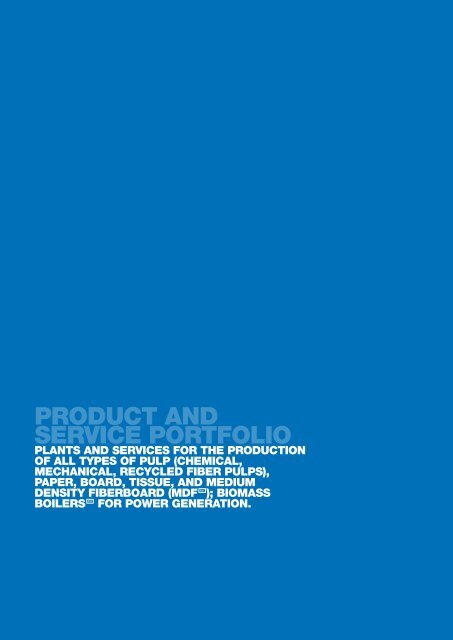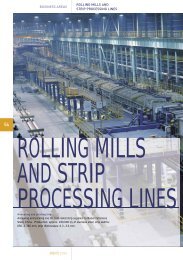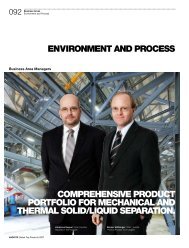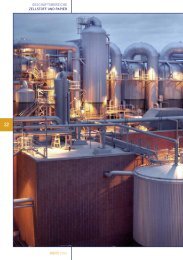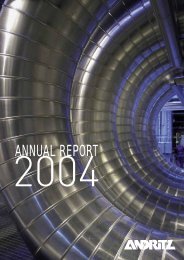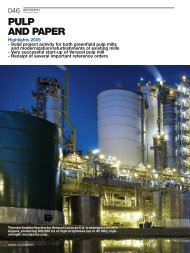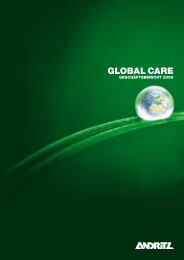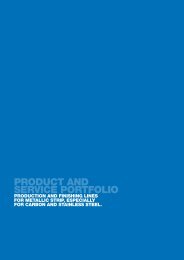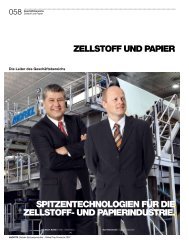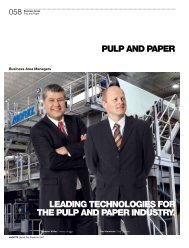Download as pdf - andritz business areas
Download as pdf - andritz business areas
Download as pdf - andritz business areas
- No tags were found...
You also want an ePaper? Increase the reach of your titles
YUMPU automatically turns print PDFs into web optimized ePapers that Google loves.
042<br />
Product and<br />
service portfolio<br />
Plants and services for the production<br />
of all types of pulp (chemical,<br />
mechanical, recycled fiber pulps),<br />
paper, board, tissue, and Medium<br />
Density Fiberboard (MDF ); biom<strong>as</strong>s<br />
boilers for power generation.
Pulp & Paper<br />
043
044 PULP & PAPER<br />
The <strong>business</strong> area managers (left to right):<br />
Karl Hornhofer Graz Austria<br />
Capital Systems<br />
Humbert Köfler Vienna Austria<br />
Service & Units
PULP & PAPER<br />
045<br />
661 billion<br />
annual reports<br />
Paper is said to have been invented by Cai<br />
Lun, a Chinese court official, in 105 AD. He<br />
w<strong>as</strong> the first to describe the papermaking<br />
process <strong>as</strong> we know it today. Today, the average<br />
annual paper consumption per capita<br />
in Europe is 186 kilograms, 301 kilograms<br />
in the USA. Global production of paper and<br />
board is close to 380 million tons annually<br />
(source: VDP, 2006). This would be enough<br />
to produce 661 billion copies of this annual<br />
report – if you were to stack these copies one<br />
on top of the other, the pile would be more<br />
than five million kilometers high.<br />
Wood, annual plants, and w<strong>as</strong>tepaper are<br />
used to produce pulp for paper, tissue,<br />
board, fiberboard, and nonwovens production.<br />
ANDRITZ PULP & PAPER is among<br />
the global market leaders for equipment to<br />
produce all types of pulp (chemical, mechanical,<br />
recycled fiber pulps).<br />
Library at Admont Benedictine Mon<strong>as</strong>tery,<br />
Austria, the largest library in a mon<strong>as</strong>tery worldwide.
046 PULP & PAPER<br />
PROFILE<br />
The PULP & PAPER <strong>business</strong> area is a leading<br />
global supplier of systems, equipment,<br />
and services for the production of all types of<br />
pulp (chemical, mechanical , recycled fiber<br />
pulps), paper, board, tissue, Medium Density<br />
Fiberboard (MDF), and nonwovens , <strong>as</strong><br />
well <strong>as</strong> of biom<strong>as</strong>s power boilers for electricity<br />
generation.<br />
Through the acquisition and integration of<br />
complementary technologies, the <strong>business</strong><br />
area h<strong>as</strong> become a full-line supplier of production<br />
systems and services to the pulp<br />
and paper industry. The technologies are<br />
employed for the processing of logs and annual<br />
fibers; the production of chemical and<br />
mechanical pulps (cooking or refining ,<br />
w<strong>as</strong>hing, bleaching, and drying); the recovery<br />
and reuse of chemicals; the generation of<br />
energy from biom<strong>as</strong>s; the preparation of paper<br />
machine furnish from virgin or recycled<br />
fibers; the production of tissue and board<br />
products; the calendering and coating<br />
of paper; and the handling of reject materials<br />
and sludges.<br />
Services include complete mill maintenance;<br />
equipment upgrades and rebuilds; engineered<br />
wear products for all types of equipment;<br />
and complementary technical services.<br />
Depending upon a customer’s needs, the<br />
<strong>business</strong> area provides b<strong>as</strong>ic and detailed<br />
engineering, procurement, manufacturing,<br />
equipment erection, construction supervision,<br />
training, and start-up services, <strong>as</strong> well<br />
<strong>as</strong> EPC deliveries.<br />
The wire wrap of a twin-wire press is being<br />
me<strong>as</strong>ured. Twin-wire presses are used to dewater<br />
fiber stock in pulp production. ANDRITZ twin-wire<br />
presses achieve high dry solids contents and,<br />
thus, high production capacities for customers.
PULP & PAPER<br />
047
048 PULP & PAPER<br />
marKet<br />
develoPment<br />
The market for pulp production plants and<br />
systems showed a varying development during<br />
2008. During the first three quarters of<br />
2008, investment activity remained satisfactory,<br />
both for modernizations and greenfield<br />
projects, in spite of the prevailing financial<br />
and economic crisis. During the fourth quarter,<br />
however, project activity declined significantly,<br />
mainly <strong>as</strong> a result of the marked decre<strong>as</strong>e<br />
in pulp prices, capacity reductions in<br />
pulp and paper mills in the USA and Europe,<br />
and difficulties in the financing of single projects.<br />
This development w<strong>as</strong> also reflected in significant<br />
pulp price changes during 2008. The<br />
price for NBSK (Northern Bleached Softwood<br />
Kraft Pulp) incre<strong>as</strong>ed from approximately<br />
860 USD per ton at the beginning of<br />
January to approximately 920 USD per ton at<br />
the beginning of July. Then it started to decline<br />
and w<strong>as</strong> at 650 USD per ton at year’s<br />
end, with spot prices being significantly lower.<br />
The main re<strong>as</strong>ons for the marked price<br />
decre<strong>as</strong>e during the fourth quarter of 2008<br />
were a significant reduction of pulp inventories,<br />
the substantial decline in pulp demand,<br />
particularly in China, <strong>as</strong> a result of the economic<br />
downturn, and the strength of the US<br />
dollar against the Euro.<br />
The price for short-fiber pulp (birch and eucalyptus)<br />
showed a similar development. It incre<strong>as</strong>ed<br />
from approximately 750 USD at the<br />
beginning of January 2008 to approximately<br />
850 USD at mid-year and – due to the difficult<br />
economic situation – decre<strong>as</strong>ed markedly<br />
to approximately 650 USD by year’s end,<br />
with spot prices being significantly lower in<br />
this segment, too.<br />
Special technical and financial terms are marked at<br />
their first occurrence in a chapter. They are explained in<br />
the glossary starting on page 104. If you have any queries,<br />
ple<strong>as</strong>e do not hesitate to contact us at<br />
welcome@<strong>andritz</strong>.com<br />
Metsä-Botnia’s Fray Bentos mill in Uruguay is the<br />
first pulp mill worldwide to have the entire process<br />
equipment, maintenance concept, and maintenance<br />
services provided by one supplier – ANDRITZ.
PULP & PAPER<br />
049<br />
BUSINESS<br />
DEVELOPMENT<br />
Sales of the <strong>business</strong> area in 2008 amounted<br />
to 1,326.6 MEUR, thus lower compared<br />
to the previous year (2007: 1,462.2 MEUR).<br />
EBITA<br />
, at 66.3 MEUR, w<strong>as</strong> significantly<br />
lower than in the previous year (2007: 87.8<br />
MEUR). This is mainly due to a considerable<br />
deterioration in market conditions <strong>as</strong> from<br />
the end of the third quarter of 2008, which<br />
led to capacity underutilizations in some divisions.<br />
The financial provisions made for capacity<br />
adjustments required <strong>as</strong> a result of this<br />
development also had a negative impact on<br />
earnings.<br />
Order intake during the reporting period w<strong>as</strong><br />
1,033.8 MEUR, thus considerably down<br />
from the very high value of the previous year<br />
(2007: 1,406.4 MEUR). The global economic<br />
crisis caused a significant decline in project<br />
activities and order awards, in particular <strong>as</strong><br />
from the end of the third quarter of 2008.<br />
The Metsä-Botnia pulp mill in Fray Bentos,<br />
Uruguay, for which ANDRITZ provided all major<br />
production technology, reached full production<br />
just 145 days from start-up (calculated<br />
on a 30-day rolling average), beating the<br />
existing start-up record set by CMPC of Chile<br />
(for this mill, too, ANDRITZ supplied the main<br />
production systems) by 26 days.<br />
Major production systems were successfully<br />
started up for Tiger Forest & Paper Co.,<br />
Ltd. – Hunan Juntai Pulp & Paper Co. <strong>as</strong> part<br />
of the complete mill delivery by ANDRITZ.<br />
Start-ups included a modern, high-capacity<br />
debarking line with the first horizontallyfed<br />
HHQ-Chipper in China, a 1,300 t/d<br />
bleached fiberline , a 1,350 t/d drying line,<br />
a 489 t/h evaporation plant , and a 2,200<br />
t/d recovery boiler .<br />
Sappi Saiccor (Pty) Ltd. finalized the mill<br />
extension at their mill in Umkoma<strong>as</strong>, Kwa<br />
Zulu-Natal in the Republic of South Africa.<br />
ANDRITZ’s delivery included screening systems,<br />
oxygen stage, and bleach plant for<br />
the 870 t/d fiberline; a 370 t/h evaporation<br />
plant with a foul condensate stripping system<br />
and methanol liquefaction equipment<br />
custom-tailored for the mill’s magnesium<br />
sulphite pulping process; and the first twinwire<br />
drying line for dissolving pulp. ANDRITZ<br />
PULP & PAPER chipping and chip handling<br />
systems had previously started up <strong>as</strong> part of<br />
this same project.<br />
A tree-length debarking and chipping<br />
line w<strong>as</strong> started up at Australian Paper’s<br />
Maryvale, Victoria mill. The capacity of the<br />
debarking line is one of the highest in the<br />
world. Earlier in the year, ANDRITZ completed<br />
a two-step modernization of the<br />
mill’s double-drum recovery boiler. At year’s<br />
end, modernization of the cooking and<br />
screening systems at the same mill w<strong>as</strong><br />
completed. As part of the modernization,<br />
ANDRITZ PULP & PAPER provided new systems<br />
for w<strong>as</strong>hing, oxygen delignification ,<br />
and bleaching.<br />
Aracruz Celulose S.A. completed an upgrade<br />
at their Barra do Riacho unit in Brazil.<br />
As part of the project, ANDRITZ incre<strong>as</strong>ed<br />
production of the 8 m pulp machine supplied<br />
in 2002 from its initial design of 2,325 t/d<br />
to a guarantee of 2,972 t/d. After the performance<br />
test in March 2008, the machine<br />
achieved a new production record: 3,112 t/d<br />
of prime quality eucalyptus pulp.<br />
The first biom<strong>as</strong>s power boiler delivered by<br />
ANDRITZ PULP & PAPER w<strong>as</strong> started up at<br />
ENCE Group’s Navia Asturi<strong>as</strong> mill in Spain.<br />
The boiler h<strong>as</strong> a capacity of 120 t/h steam<br />
production.<br />
For a greenfield newsprint and LWC production<br />
line – the first in the area of the former<br />
Soviet Union in the l<strong>as</strong>t 20 years – an<br />
RTS TMP system, supplied together with<br />
Petrozavodskm<strong>as</strong>h, w<strong>as</strong> started up for the<br />
end customer RUE, Republican Unitary Enterprise<br />
Newsprint Mill, Molodyozhnaya, Belarus.<br />
A PrimeLineCOMPACT tissue machine w<strong>as</strong><br />
started up at Fripa Papierfabrik in Miltenberg,<br />
Germany. After only two weeks, an operational<br />
speed of 1,800 m/min w<strong>as</strong> achieved.<br />
ANDRITZ acquired major <strong>as</strong>sets of Andre<strong>as</strong><br />
Kufferath GmbH & Co. KG, a German company<br />
well-established in the production of<br />
forming fabrics and technical wire cloth for<br />
the pulp and paper industry.<br />
KEY FIGURES (meur) 2008 2007* 2006* 2005 2004<br />
Order intake 1,033.8 1,406.4 1,432.4 1,017.0 1,218.9<br />
Order backlog <strong>as</strong> of December 31 752.8 1,060.4 1,124.4 950.4 951.1<br />
Sales 1,326.6 1,462.2 1,304.2 1,032.9 884.6<br />
EBITDA 84.5 105.3 89.6 76.1 77.9<br />
EBITDA margin 6.4% 7.2% 6.9% 7.4% 8.8%<br />
EBITA 66.3 87.8 75.9 63.6 64.8<br />
EBITA margin 5.0% 6.0% 5.8% 6.2% 7.3%<br />
Capital investments 20.2 21.8 21.7 13.6 14.3<br />
Employees <strong>as</strong> of December 31 5,102 4,843 3,863 3,018 2,805<br />
* restated
050 PULP & PAPER<br />
MAJOR ORDERS<br />
The <strong>business</strong> area received an order from<br />
Mondi Syktyvkar pulp and paper mill in Komi<br />
Republic, Russia to supply a new woodyard,<br />
evaporation plant, and recovery boiler, and<br />
to rebuild the mill’s two existing fiberlines.<br />
The woodyard consists of two debarking<br />
lines with the highest capacity in the world.<br />
The HHQ-Chippers are the world’s largest,<br />
with 3.87 m disc diameters and 18 cutting<br />
knives. The six-effect evaporation plant,<br />
which includes condensate stripping<br />
and a methanol liquefaction system , h<strong>as</strong><br />
a capacity of 550 t/h with a final product<br />
solids content of 75%. The 3,560 t/d recovery<br />
boiler is equipped with odorous g<strong>as</strong><br />
incineration systems and is the first in<br />
Russia with modern steam parameters (93<br />
bar pressure and 490 ºC temperature).<br />
In addition, the individual divisions received<br />
the following major orders:<br />
The Wood Processing division received<br />
two significant orders from Russia: one for<br />
the supply of a complete woodyard at a new<br />
MDF plant for Pfleiderer of Germany and the<br />
other from Investlesbumprom for a woodyard<br />
b<strong>as</strong>ed on RotaBarker debarking technology<br />
. Additionally, Veracel Celulose S/A in<br />
Brazil selected the division to incre<strong>as</strong>e the<br />
capacity of their woodyard. The delivery will<br />
include the largest single chipping line in the<br />
world (500 sub m 3 /h).<br />
The Fiberline division received the first orders<br />
for its new AWP w<strong>as</strong>h press . The<br />
first press will be installed at Stora Enso’s<br />
Skutskär mill, Sweden and the second w<strong>as</strong><br />
ordered by Södra Cell Värö Bruk in Väröbacka,<br />
Sweden. Also, the division received<br />
an order from Sun Paper Co. Ltd., Yanzhou,<br />
Shandong Province, China for a Downflow<br />
Lo-Solids ® cooking system and ECF<br />
bleaching system for a greenfield project.<br />
In addition, the division received an order<br />
from Chuetsu Pulp & Paper Company Limited<br />
for the modernization of fiberlines with<br />
ECF bleaching at their Sendai mill in Sendai<br />
City, Kagoshima Prefecture, Japan.<br />
The Recovery division received an order<br />
from Grupo Empresarial ENCE, S.A., Spain<br />
for a power boiler at its Huelva mill. In addition,<br />
the division received two orders from<br />
Portucel-Empresa Produtora de P<strong>as</strong>ta e Papel,<br />
S.A., Portugal for power boilers at the<br />
company’s Setúbal and Cacia mills. The division<br />
also received an order from Fortum<br />
Termest AS for a low-emissions Bubbling<br />
Fluidized Bed (BFB) boiler for a greenfield<br />
Combined Heat and Power (CHP) plant in<br />
Pärnu, Estonia. In addition, Sappi Fine Paper<br />
North America ordered a retrofit to incre<strong>as</strong>e<br />
the capacity of a recovery boiler at its<br />
Somerset mill in Skowhegan, Maine, USA.<br />
For Södra Cell’s Värö mill in Sweden, the division<br />
will deliver a new evaporation plant and<br />
a recovery boiler retrofit. Visy Pulp & Paper<br />
of Australia selected the division to provide a<br />
new liquid methanol plant . The division will<br />
also supply an <strong>as</strong>h leaching chlorine removal<br />
system for a MeadWestvaco mill in Tex<strong>as</strong>,<br />
USA. This will be the first chlorine removal<br />
ANDRITZ debarking drums are used to debark<br />
and w<strong>as</strong>h logs for pulp production.
PULP & PAPER<br />
051<br />
system in the USA that leaches the <strong>as</strong>h from<br />
the recovery boiler precipitator. Metsä-Botnia’s<br />
mill in Fray Bentos, Uruguay also ordered<br />
an <strong>as</strong>h leaching chlorine removal system,<br />
which will be one of the largest in the<br />
world.<br />
The Chemical Systems division received<br />
an order from Sun Paper Shandong for systems<br />
to incre<strong>as</strong>e white liquor production<br />
and quality at the Yanzhou City mill in Shandong<br />
Province, China. In addition, the division<br />
w<strong>as</strong> awarded orders to supply a g<strong>as</strong> collection<br />
system for April’s Rizhao mill in China<br />
and a green liquor cooler to Marusumi Paper<br />
in Japan.<br />
The Pulp Drying Systems division received<br />
an order from Guangxi Jingui Pulp & Paper<br />
Co., Ltd. for two slab presses at Guangxi,<br />
China. In addition, the division will also upgrade<br />
the existing screening plant at Södra<br />
Cell AB’s mill in Mönster<strong>as</strong>, Sweden.<br />
The newly developed ANDRITZ w<strong>as</strong>h press is used<br />
in chemical and mechanical pulp production; it is<br />
particularly well suited for rebuilds and upgrades to<br />
incre<strong>as</strong>e the capacity of existing pulping lines. Shortly<br />
after the new product w<strong>as</strong> launched, the first two w<strong>as</strong>h<br />
presses were ordered by a customer in Sweden.<br />
The Paper Machine division received an order<br />
from Saigon Binh Dinh Paper Corp. in<br />
Vietnam for a new PrimeLineCOMPACT tissue<br />
machine, including a steel Yankee . The<br />
division also received an order from Procter<br />
& Gamble to supply a new tissue and towel<br />
machine for the Family Care plant being constructed<br />
in Box Elder County, Utah, USA. In<br />
addition, the division will upgrade a paper/<br />
board machine for Cartonstrong Italia S.r.I. at<br />
Monza, Italy and will supply a new headbox .<br />
The division received an order to rebuild a<br />
board machine producing white-lined chipboard<br />
for Kartonsan Karton Sanayi ve Ticaret<br />
A.S. at the Izmit mill in Izmit, Kocaeli, Turkey.<br />
For a customer in Italy, the division will supply<br />
a shoe press and auxiliary equipment.<br />
Sappi Austria Produktions-GmbH & Co KG.,<br />
Austria ordered another sheet stabilizer.<br />
Refining zone of an ANDRITZ refiner used in<br />
mechanical pulp production. This high-consistency<br />
refiner is the largest double-disc refiner worldwide.
052 PULP & PAPER<br />
The Fiber Preparation Systems division<br />
will supply a complete deinking line to Yueyang<br />
Paper Co., Ltd. for the mill in Yueyang,<br />
Hunan Province, China. SCA Graphic Laakirchen<br />
AG of Laakirchen, Austria ordered<br />
an extension of its existing deinking plant,<br />
including disc filters and twin-wire presses.<br />
Portucel, a member of the Portucel Soporcel<br />
Group, ordered a complete refining line for<br />
its Setúbal, Portugal mill. At the same mill,<br />
the division will supply a FlyingWing Deculator<br />
® . Stock preparation and paper machine<br />
approach equipment w<strong>as</strong> ordered by Nanping<br />
Paper at Nanping, Fujian, China.<br />
The Mechanical Pulping Systems division<br />
received an order to double the capacity of<br />
an existing bleach plant for cotton combers<br />
at Louisenthal’s Königstein mill in Germany.<br />
The division also received two repeat orders<br />
from customers in China: one from MCC Paper<br />
Group Yinhe Co. Ltd. at Linqing, Shandong<br />
Province, and the second from Sun Paper<br />
Group in Yanzhou, Shandong Province<br />
for complete P-RC TM systems. Investlesbumprom<br />
in Kama ordered the first P-RC TM<br />
APMP system to be installed in Russia.<br />
The Panelboard Systems department received<br />
an order from Pfleiderer MDF OOO for<br />
the supply of a turnkey front-end package for<br />
a new plant in Novgorod, Russia. The scope<br />
of supply comprises the complete woodyard<br />
(incl. a RotaBarker), chip w<strong>as</strong>hing system,<br />
the pressurized refining system, <strong>as</strong> well <strong>as</strong><br />
the steel structure, piping, cabling, complete<br />
erection, and start-up <strong>as</strong>sistance. Also, the<br />
department w<strong>as</strong> awarded two orders by<br />
Yingang Wood B<strong>as</strong>ed Panel Co. Ltd. for the<br />
delivery of pressurized refining systems for<br />
plants in Sichuan and Hubei, China. Orders<br />
for pressurized refining systems received via<br />
Dieffenbacher, Germany were for Fengkai<br />
Weilibang Wood Industry Co. Ltd., Guangdong<br />
(the fifth ANDRITZ PULP & PAPER line<br />
for the Weihua Group), and ShaanXi Zhong<br />
Xing Timber Co. Ltd., Shaanxi, China. Anhui<br />
Huqian Investment & Industry Co. Ltd., Anhui,<br />
China ordered a fiber preparation system<br />
consisting of a woodyard, a chip w<strong>as</strong>hing,<br />
and pressurized refining system.<br />
The Paper Finishing division received an<br />
order from Cham-Tenero Paper Mills Inc. in<br />
Switzerland to perform a turnkey rebuild of<br />
an existing coating line . The rebuild will<br />
be the first application of a multi-layer curtain<br />
coater on a real off-line paper coating<br />
machine. After the successful installation<br />
of the new threading system PrimeFeeder<br />
at Burgo Mantova, Italy, eight more feeding<br />
systems have been installed, seven at a German<br />
mill. The division received an order from<br />
Fujian Quingshan, Fujian Province, China for<br />
a PrimeCal Hard calender. The division also<br />
introduced a new product – PrimeRoll Eco<br />
– and the first unit w<strong>as</strong> sold to a mill in Sweden.<br />
An order for a PrimePress X , which is<br />
part of a turnkey rebuild of an existing press,<br />
w<strong>as</strong> received from Stora Enso for its Imatra,<br />
Finland mill.<br />
The Engineered Wear Products division<br />
w<strong>as</strong> awarded a contract from Boise C<strong>as</strong>cade,<br />
USA, for refiner plates at all of their<br />
Tissue paper production: The first ANDRITZ<br />
PrimeLineCOMPACT plant w<strong>as</strong> started<br />
up at Fripa (Papierfabrik Albert<br />
Friedrich), Miltenberg, Germany.<br />
mill locations. The division renewed threeyear<br />
contracts with White Birch Papers in<br />
the USA and Canada. The division w<strong>as</strong> also<br />
awarded a major order for refiner plates from<br />
PT Kertus Kraft in Ache, Indonesia for the<br />
restart of its kraft linerboard<br />
mill. Major orders<br />
for screen b<strong>as</strong>kets were received from<br />
Nine Dragon in China, Ust-Ilimsk in Russia,<br />
and AbitibiBowater in Canada.<br />
The Pulp Engineered Services division<br />
signed long-term Overall Production Efficiency<br />
(OPE ® )<br />
agreements for customer mills<br />
in Russia and Sweden. The division received<br />
a major wood processing upgrade order in<br />
Denmark, and an order for a woodyard upgrade<br />
from Stora Enso’s Fors mill in Sweden.<br />
One of the largest cooking upgrade orders<br />
came from Finland for new digester screens<br />
and a top separator. Another large cooking
PULP & PAPER<br />
053<br />
upgrade order w<strong>as</strong> received from International<br />
Paper, E<strong>as</strong>tover, SC, USA. The division received<br />
several orders for recovery boiler upgrades<br />
in Central Europe, Portugal, Finland,<br />
and China.<br />
(Lenções Paulista mill). For VCP’s Jacareí mill<br />
in Brazil, the division h<strong>as</strong> been contracted to<br />
analyze and maintain 15 of the mill’s hydraulic<br />
units, including programming of the logic<br />
controllers.<br />
The Paper Engineered Services division<br />
received significant orders for dewatering<br />
equipment from CMPC in Chile, Matussière<br />
in France, and AbitibiBowater in the USA. Orders<br />
were received from CMPC, Chile for service<br />
and a refiner upgrade and from Perlen<br />
Papier, Switzerland for refiner upgrades. In<br />
Russia, a contract for the overhaul of a refiner<br />
and bearing unit w<strong>as</strong> signed at Mondi<br />
Syktyvkar. In France, the division received an<br />
order from NSI Golbey to service five refiners<br />
over a contract period ending in 2011. In<br />
North America, the division will upgrade the<br />
hydraulic system and provide a new refiner<br />
protection system for Abitibi-Consolidated<br />
Inc., Beaupre, Quebec, Canada. In South<br />
America, Duratex SA ordered a wear part rebuild<br />
for a pressurized MDF refiner at its plant<br />
in Agudos, São Paulo state, Brazil. Production<br />
incre<strong>as</strong>es were achieved for various Brazilian<br />
customers – Suzano Bahia Sul (Mucuri<br />
mill), Cenibra (Belo Oriente mill), and Lwarcel<br />
The Automation Solutions division received<br />
an order from Papierfabrik Palm<br />
GmbH, Aalen, Germany for modernization<br />
of the deinking plant’s DCS and automation<br />
technology. A special service concept<br />
(‘On-the-Fly’ upgrade) will be employed to<br />
minimize production interruptions. To Freeport-McMoRan’s<br />
Climax molybdenum mine<br />
in Colorado, USA the division will supply a<br />
dynamic simulator and modernization of the<br />
automation systems. An order w<strong>as</strong> awarded<br />
by PetroCanada for an IDEAS Simulator including<br />
models, operator training, and software<br />
for its Fort Hills oil sands plant in Alberta,<br />
Canada.<br />
Scheme of an ANDRITZ PrimeLine<br />
machine for paper and board production.<br />
Detail of the PrimeLine packaging paper machine<br />
which is being constructed by ANDRITZ<br />
for Hebei Yongxin Paper, one of China’s<br />
largest packaging paper producers.
054 PULP & PAPER<br />
RESEARCH AND<br />
DEVELOPMENT<br />
The <strong>business</strong> area is focusing its R&D activities<br />
on both new greenfield plants and plants<br />
that are already in use (brownfield plants).<br />
Activities are focused on optimization of energy,<br />
raw materials, and effluents; upgrades<br />
of existing products to improve their energy<br />
efficiency and reliability; and new products<br />
which will continue to maximize production<br />
while lowering investment and operating<br />
costs.<br />
ANDRITZ technologies that support the drive<br />
for sustainable production considerably reduce<br />
w<strong>as</strong>te of energy, chemicals, water, and<br />
fibers. This is also evident in the development<br />
of new systems which efficiently process<br />
both wood and plantation fibers and<br />
systems which maximize energy efficiency.<br />
Considerable effort is being employed to effectively<br />
utilize biom<strong>as</strong>s <strong>as</strong> an energy source.<br />
Advanced control systems for all pulp and<br />
paper mill processes are being developed<br />
and tested.<br />
The divisions’ R&D programs in detail<br />
are <strong>as</strong> follows:<br />
Wood Processing<br />
The incre<strong>as</strong>ing importance of environmental<br />
performance and the push towards full utilization<br />
of renewable resources is focusing the<br />
development of wood processing systems<br />
for biom<strong>as</strong>s handling and processing.<br />
Fiberline Systems<br />
Technology development continues to focus<br />
on lowering the investment cost per ton of<br />
pulp produced, which is being accomplished<br />
through process simplification, incre<strong>as</strong>ed<br />
unit capacities, standardization, and modularization.<br />
In terms of scale and capacity, the<br />
5,000 t/d single fiberline is already a reality.<br />
To lower the environmental impact, less<br />
chemicals are now required for cooking and<br />
bleaching, and fresh water consumption h<strong>as</strong><br />
been reduced. Simplified process design and<br />
improved equipment efficiencies are also<br />
consuming less energy.<br />
Chemical Systems<br />
The division is further developing technologies<br />
for environmental sustainability and incre<strong>as</strong>ed<br />
capacities of pulp mills. In terms of<br />
capacity, a new lime kiln h<strong>as</strong> been commissioned<br />
with a capacity of 1,000 t/d. The<br />
application of centrifuge technology for dregs<br />
dewatering and w<strong>as</strong>hing is gaining acceptance,<br />
which minimizes the volume of dregs<br />
in landfills. A new front-end technology for<br />
lime kilns, LimeFl<strong>as</strong>h , is now in operation<br />
to considerably boost the throughput<br />
that can be achieved from existing conventional<br />
or LMD kilns .<br />
Recovery Systems<br />
Rising energy costs have boosted the demand<br />
for advanced biom<strong>as</strong>s-fired power<br />
boilers which are suited for bark, forest residues,<br />
and short-rotation small trees. The first<br />
biom<strong>as</strong>s g<strong>as</strong>ification plant using Carbona<br />
technology to produce fuel g<strong>as</strong> is now in operation<br />
in Denmark; ANDRITZ’s affiliate Carbona<br />
is a specialist in g<strong>as</strong>ification systems.<br />
Applications for lime kiln fuel g<strong>as</strong> production<br />
(to replace oil/natural g<strong>as</strong>) are ready for the<br />
market. Development of pressurized g<strong>as</strong>ifiers<br />
for liquid biofuels continues. Other g<strong>as</strong>ifier<br />
applications under development include upgrading<br />
of the steam parameters in recovery<br />
boilers and integrated g<strong>as</strong>ification combinedcycle<br />
plants (IGCC ) for improved electrical<br />
efficiency.
PULP & PAPER<br />
055<br />
High Energy Recovery Boilers (HERB )<br />
at pulp mills incre<strong>as</strong>e electricity generation<br />
from black liquor . As mills continue<br />
to close their chemical circulation loops to<br />
reduce emissions and generate more electricity,<br />
chloride removal is becoming more<br />
important. The new leaching-b<strong>as</strong>ed chloride<br />
removal process by ANDRITZ PULP &<br />
PAPER offers a lower cost alternative to <strong>as</strong>h<br />
re-crystallization.<br />
Technology development in the evaporation<br />
<strong>business</strong> is aimed at producing highly efficient,<br />
low (or zero) effluent evaporation systems.<br />
These environmentally friendly evaporators<br />
and related technologies ensure low<br />
energy consumption and minimal raw material<br />
losses.<br />
Pulp Drying Systems<br />
The focus is on incre<strong>as</strong>ing the production capacity<br />
of drying lines to the target of 600 t/d<br />
per meter working width to cover the needs<br />
of pulp mills of the future that will produce<br />
1.5 million t/y or more in a single line. This<br />
requires new forming and pressing concepts,<br />
improved heat transfer within the airborne<br />
dryer , and operating speeds of the cutter/<br />
layboy in excess of 300 m/min. For the finishing<br />
line, the target is to incre<strong>as</strong>e the production<br />
rate and improve equipment availability.<br />
ANDRITZ service specialists finalizing modernization<br />
work in the course of a disc filter rebuild<br />
at Stora Enso’s mill in Saxony, Germany.
056 PULP & PAPER<br />
Paper Machines<br />
Developments in tissue machines include<br />
the PrimeDry Steel, made of welded steel,<br />
which gives higher performance and is operationally<br />
safer than a c<strong>as</strong>t iron Yankee.<br />
In the air engineering department, the focus<br />
is on energy savings. A new step in heat recovery<br />
from the exhaust of Yankee hoods<br />
(ReEvaporation) saves up to 25% primary<br />
steam by re-evaporating condensate in a<br />
heat exchanger using exhaust air.<br />
Fiber Preparation Systems<br />
R&D work focused on optimizing the new<br />
low-consistency pulping systems in w<strong>as</strong>tepaper<br />
processing. This is a major step in improving<br />
system efficiency and reducing energy<br />
consumption.<br />
Mechanical Pulping Systems<br />
One focus of the division’s R&D work is the<br />
testing of new wood species such <strong>as</strong> eucalyptus,<br />
acacia, birch, maple, and also annual<br />
plants such <strong>as</strong> bag<strong>as</strong>se , reed, or kenaf<br />
for mechanical pulping. This supports sustainable<br />
development in countries with different<br />
wood species or where wood is a rare<br />
resource.<br />
Further research is being conducted to reduce<br />
the effluent flows from all mechanical<br />
pulping systems and in the panelboard industry.<br />
The goal is to develop low-effluent<br />
mills and chemical recovery systems which<br />
reduce effluent pollution to the minimum.<br />
Minimizing energy consumption remains<br />
the main focus in the panelboard industry.<br />
In addition, there are ongoing investigations<br />
to produce high-quality fibers from annual<br />
plants <strong>as</strong> an alternative to wood chips and<br />
other wood by-products.<br />
Paper Finishing<br />
The main focus of development work h<strong>as</strong><br />
been on shoe rolls for pulp, paper, and<br />
tissue applications. For the tissue-making<br />
industry, a newly developed shoe roll – the<br />
smallest and f<strong>as</strong>test in the market – h<strong>as</strong> been<br />
successfully installed and started up.<br />
In calendering technology, a value analysis<br />
study w<strong>as</strong> completed. Cost reduction and<br />
acceleration of deliveries have been reached<br />
through modular calender design which<br />
achieves the same functionality <strong>as</strong> conventional<br />
units.<br />
A new design PrimeFeeder technology h<strong>as</strong><br />
been introduced that stabilizes the threading<br />
process and shortens the time it takes for a<br />
paper machine to reach full production after<br />
a sheet break.<br />
Pulp Engineered Services<br />
The leading development program continues<br />
to be OPE ® (Overall Production Efficiency),<br />
where the target is to enhance production<br />
efficiency and maintenance practices in order<br />
to secure the highest life cycle profits for<br />
customers. Supporting OPE ® is the Life Cycle<br />
Profits (LCP) program, which helps to secure<br />
and maximize profitable operations for<br />
customers. The program consists of several<br />
elements, where predictive tools for online<br />
diagnostics of pulping processes are being<br />
developed. Software tools for improving<br />
predictive maintenance are being introduced.<br />
Examples: software to determine the most<br />
cost-effective timing for changing chipper<br />
knives; software to predict the maintenance<br />
needs for hydraulic drives; software to ensure<br />
the smooth functioning of w<strong>as</strong>hers even<br />
under difficult, volatile circumstances.<br />
Paper Engineered Services<br />
The R&D focus is on reducing operating costs<br />
of equipment already installed in a customer’s<br />
plant. This involves optimizing the machine<br />
design to reduce energy consumption<br />
and the usage of consumables, to incre<strong>as</strong>e<br />
reliability, and to reduce maintenance costs.<br />
Newly developed technologies have been introduced<br />
in the are<strong>as</strong> of sealing, wear, and<br />
machine control, thus enabling customers to<br />
profitably operate their existing equipment,<br />
regardless of the original manufacturer. For<br />
the pulping of stock, broke, and recycled fiber,<br />
a development program is in progress to<br />
enable up to 20% energy savings for the majority<br />
of pulpers installed in mills.<br />
Automation Solutions<br />
In the automation area, SpectraVision optical<br />
sensors were introduced to me<strong>as</strong>ure fiber<br />
properties continuously without sampling.<br />
The sensor requires significantly less maintenance<br />
and eliminates the need for intense<br />
recalibration often required for competitive<br />
units. Advanced process control systems<br />
to achieve fully automated production lines<br />
were introduced for all process are<strong>as</strong> of pulp<br />
and paper mills. These systems are built using<br />
the BrainWave ® model-predictive controller<br />
and the expertise of ANDRITZ technologists<br />
encapsulated into the ACE<br />
(Advanced Control Expert) products. The<br />
IDEAS training simulator w<strong>as</strong> augmented using<br />
the new Instructor software to monitor<br />
the operator’s progress <strong>as</strong> he/she learns the<br />
new processes and to provide a certification<br />
process for operators.
PULP & PAPER<br />
057<br />
Growth market China:<br />
indePendent sun<br />
shines in the e<strong>as</strong>t<br />
Paper consumption in China is growing<br />
rapidly; the needs of the 1.3 billion people<br />
for paper products of incre<strong>as</strong>ingly<br />
high quality have to be met. The worldwide<br />
lack of raw materials, however, is<br />
limiting the offering and, thus, growth of<br />
the paper industry. ANDRITZ technologies<br />
help customers to produce their<br />
own pulp – the raw material for paper<br />
production – in their own country and<br />
thus gain independence from international<br />
pulp suppliers.<br />
One paper producer with a strategy to become<br />
independent in this respect is the Sun<br />
Ying Guangdong, Deputy General Manager and<br />
Chief Engineer of Sun Paper Group<br />
Paper Group in Yanzhou, Shandong Province.<br />
In China, Sun Paper is the largest privately<br />
owned and managed paper <strong>business</strong>,<br />
<strong>as</strong> well <strong>as</strong> the largest producer of premium<br />
coated packaging board. The company’s 22<br />
paper machines (the 23 rd is now under construction)<br />
with a total capacity of 2.5 million<br />
tons per year, are now being partially supplied<br />
by their first ANDRITZ P-RC TM APMP<br />
line with a mechanical pulp production capacity<br />
of 100,000 tons per year. Earlier, Sun<br />
Paper purch<strong>as</strong>ed this pulp from other APMP<br />
plants, but they are now in a position to produce<br />
their own. Shortly after starting up the<br />
first line, Sun Paper and ANDRITZ PULP &<br />
PAPER signed a second contract in March<br />
2008 for another line with almost double the<br />
capacity of the first one.<br />
High product quality<br />
and energy efficiency<br />
The ANDRITZ P-RC TM APMP process is ideally<br />
suited for the pulping of various Asian<br />
hardwoods like poplar and eucalyptus, because<br />
it produces a high-quality pulp in a<br />
very energy-efficient way, which makes it<br />
perfectly matched for the Chinese needs.<br />
Ying Guangdong, Deputy General Manager<br />
and Chief Engineer of Sun Paper Group, is<br />
complimentary of the technologies provided.<br />
‘The major advantages of ANDRITZ technologies<br />
are their highly flexible design, low energy<br />
consumption, and high production capacity,’<br />
he says. ‘The start-up of the plant w<strong>as</strong> so<br />
successful that we were reaching quality and<br />
capacity targets within a week,’ adds Manfred<br />
Fitz, ANDRITZ Project Manager.<br />
The major advantages of<br />
ANDRITZ technologies are their<br />
highly flexible design, low energy<br />
consumption, and high production<br />
capacity.<br />
Evaporation for zero discharge<br />
Sun Paper needed the APMP pulp to blend<br />
with their other raw material grades (e.g.<br />
deinked pulp from imported w<strong>as</strong>tepaper,<br />
kraft, and other mechanical pulps) to<br />
achieve the required paper properties. As<br />
part of the investment, an evaporation system<br />
w<strong>as</strong> needed to process the effluents and<br />
recover the water. Sun Paper chose to install<br />
three new MVR evaporation systems<br />
ANDRITZ PULP & PAPER.<br />
from<br />
The Sun Paper Group’s new evaporation<br />
units are the first in China to be used in this<br />
way for the w<strong>as</strong>tewater system. ‘With the<br />
evaporation units from ANDRITZ, we get very<br />
good results, which is a favorable precondition<br />
for us to achieve zero discharge,’ Ying<br />
points out.<br />
Taking care of interfaces<br />
For such a major greenfield project, several<br />
interfaces (e.g. wood handling, chip storage,<br />
fiberline, evaporation, etc.) have to be taken<br />
care of. ‘We selected the Distributed Control<br />
System from ANDRITZ because it could control<br />
multiple systems with its own supervisory<br />
functions,’ Ying says. ‘The interface with other<br />
systems is quite efficient. ANDRITZ understands<br />
all the various system controls, providing<br />
us with the most suitable solution. Of<br />
course, this w<strong>as</strong> strengthened by frequent<br />
positive communications between ANDRITZ<br />
specialists and our operators.’<br />
Cooperation is the key<br />
‘The cooperation between ANDRITZ and Sun<br />
Paper h<strong>as</strong> been very effective, congenial, and<br />
professional,’ Ying confirms. ‘We exchanged<br />
views about every question and issue, and<br />
came to a solid and satisfactory conclusion<br />
without effort. Only with this kind of cooperation<br />
could we get a successful start-up. The<br />
f<strong>as</strong>t-track delivery of ANDRITZ’s equipment<br />
w<strong>as</strong> excellent. In this way, the whole project<br />
period w<strong>as</strong> shortened.’<br />
Further information on ANDRITZ PULP & PAPER is<br />
available at: www.<strong>andritz</strong>.com


